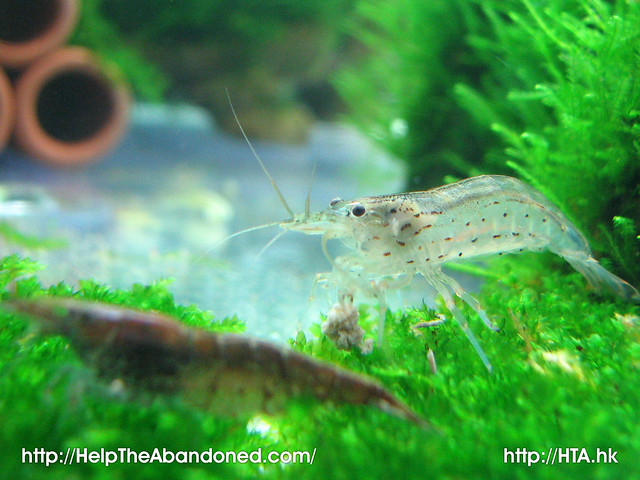Category:
Common Name: Amano Shrimp, Algae Shrimp, Caridina japonica
Scientific Name: Caridina multidentata
Description:
Origin:
Life Span:
Diet:
Additional Diet Information:
Gender Difference:
Breeding:
Temperament/Social Behavior:
Common Diseases:
Availability:
Additional Information or Photos

Female Caridina multidentata

Male Caridina multidentata
Inverts
Common Name: Amano Shrimp, Algae Shrimp, Caridina japonica
Scientific Name: Caridina multidentata
| Temperature | pH Range | Hardness (dH) | Max. Size | Min. Tank Size | Swim Area |
| 70-82 | 6-8 | 3-10 | 2 inches | 1 gallon | All Areas |
Description:
Amano shrimp, named after famed Japanese aquascaper/photographer, can be found in Japanese swamps and marshes munching on algae. They were introduced to the U.S. aquarium trade in the early 1990's, quickly gaining a reputation as ravenous algae eaters. They will scour the substrate and pick-out out bits of leftover food. However, it is their use as algae-eaters that makes them so popular. Amano shrimp will eat almost any type of algae including brown and hair algae. They should be kept in a planted tank with plenty of hiding spots.
Origin:
Japan
Life Span:
2-3 years
Diet:
Omnivore
Additional Diet Information:
Amanos are scavengers that will eat leftover food, plant detritus, and many types of algae. If given supplemental food, such as algae tabs, the shrimp will stop eating algae.
Gender Difference:
Dimorphic
Females are distinguished from males by the more elongated lower row of dots lining the body. Females are also relatively larger, reaching 5 cm, while males only grow to 3.5 cm.
Breeding:
Egg Layer
Amanos are more difficult to breed in captivity compared to other freshwater shrimp. Females will hold many eggs in their saddle, though they will never hatch in freshwater. In brackish water, the eggs will hatch into larvae, instead of fully developed baby shrimp. The larvae require water with 35ppt saltwater that is light green with Tetraselmis algae. However, there has been anecdotal evidence that the shrimp have bred in salt-free aquariums;though it is rare.
Temperament/Social Behavior:
- Peaceful, Active, Schooling fish/Usually found in groups
Common Diseases:
Availability:
Easily Obtained
Additional Information or Photos

Female Caridina multidentata

Male Caridina multidentata